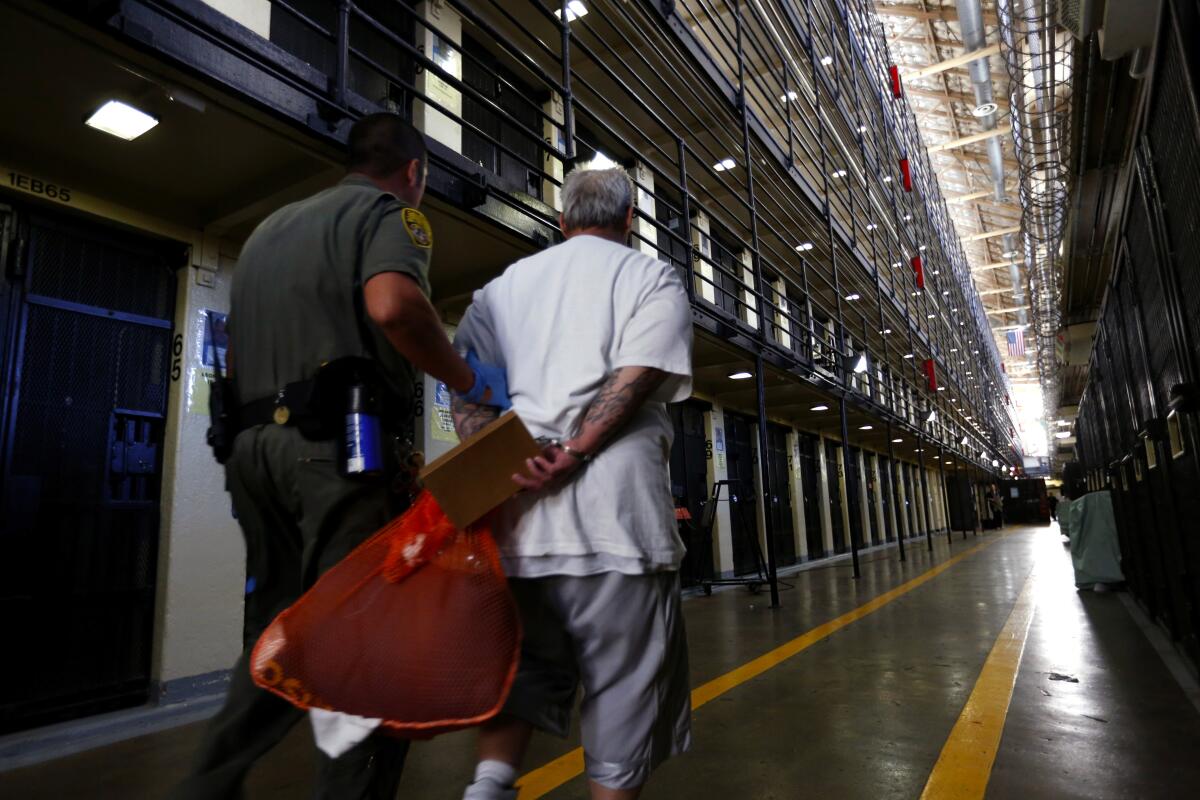California Politics: The death penalty debate turns 50

- Share via
It wasn’t what then-Gov. Ronald Reagan expected from his first appointee to the California Supreme Court.
Reagan’s surprise arrived on Feb. 18, 1972, during a visit to San Francisco. From its chambers a few miles away, the state’s high court had ruled the death penalty was unconstitutional. And the opinion was written by then-Chief Justice Donald Wright, previously praised by Reagan as “a man committed to the principle of judicial restraint.”
The Republican governor had been blindsided.
“I’m deeply disappointed and somewhat shocked by the decision,” Reagan told reporters later that day. “The court is setting itself up above the people and their legislators.”
In his 2003 book on Reagan’s time in Sacramento, veteran political reporter Lou Cannon wrote that the judge had reportedly expressed his clear support for capital punishment in a private meeting with the governor before his appointment.
But one of Wright’s fellow justices told The Times in 1986 that colleagues knew the chief justice felt otherwise. And in the opinion published 50 years ago Friday, Wright didn’t mince words.
“We have concluded that capital punishment is impermissibly cruel,” he wrote for the majority in People vs. Anderson. “It degrades and dehumanizes all who participate in its processes. It is unnecessary to any legitimate goal of the state and is incompatible with the dignity of man and the judicial process.”
Decades of debate
As noted by Cannon, who recently retired from political journalism, it was not the kind of legacy the governor intended to leave.
“Although Reagan had not intended it, he had with Wright’s appointment set in motion a long California moratorium on the death penalty” Cannon wrote.
Even bigger death penalty news soon followed, when the U.S. Supreme Court delivered a sweeping rebuke that summer of capital punishment laws in several states. In California, the issue veered back and forth — a November 1972 ballot measure to reinstate the death penalty, another high court blow against it in 1976, a second pro-death penalty ballot measure passed in 1978.
All the while, no prisoner on death row was executed. Twenty-five years would pass between the last pre-Anderson execution in 1967 and the execution of Robert Alton Harris in 1992. A dozen more men were put to death after Harris, the last being Clarence Ray Allen in 2006.
Since that time, federal judges have blocked California’s execution protocols and alternatives have stumbled. State officials were working to clear those obstacles when Gov. Gavin Newsom, two months after taking office, ordered a moratorium on the death penalty.
‘Preparing voters’ to repeal
Five decades after the stunning 1972 court ruling, capital punishment in California exists in name only.
There’s certainly no sign that Newsom has changed his mind about the 2019 moratorium. In fact, just the opposite: His administration has accelerated its efforts to move condemned prisoners off San Quentin State Prison’s infamous death row and into other facilities across the state. And the liberal Democratic governor — who hasn’t shied away from casting his opposition to capital punishment in moral terms — insists that the moratorium will exist as long as he remains governor.
There are 694 people awaiting execution in California, a list that consists of 673 men and 21 women. Almost 40% of the men on death row were sentenced in the ‘90s. Almost three dozen have been death row inmates for 40 years or longer.
And there remain conflicting signs from California voters about how to resolve the issues surrounding capital punishment. In the spring of 2021, a poll conducted by UC Berkeley’s Institute of Governmental Studies and co-sponsored by The Times found that while a plurality of voters surveyed — 44% — would support a ballot measure to repeal the death penalty, 1 in 5 respondents remained undecided.
“It’s a dialogue we must have with voters,” said Assemblymember Marc Levine, a Marin County Democrat who has a pending bill to place an effort to repeal the law on the ballot.
Friday marks not only the 50th anniversary of the California Supreme Court ruling, but also the first anniversary of Levine’s constitutional amendment being referred to an Assembly committee for a hearing.
It’s never received that hearing.
Levine, a candidate for state insurance commissioner, said he worries about the chances of an innocent person being put to death and acknowledges that recent elections have offered setbacks. Voters refused in 2012 and again in 2016 to repeal the state’s death penalty, while approving a separate 2016 ballot measure that promised (but has failed) to speed up the lengthy process.
Still, Levine said he believes Newsom’s gradual dismantling of the state’s execution protocols might make it easier for Californians to accept that the most effective punishment for heinous crimes is a sentence of life without the possibility of parole.
“We’re bringing California along on this path to end the death penalty, demonstrating that we can end it and preparing voters to understand why it must come to an end,” he said.
Newsom’s low marks on homelessness, crime
Although it’s a long way from evidence that Newsom’s reelection campaign is in trouble — last year’s failed effort to remove him from office seems to have kept potentially powerful opponents on the sidelines — this week’s Berkeley/L.A. Times poll made it clear that voters think he’s failing on some key issues.
Two-thirds of voters surveyed gave the governor a rating of poor or very poor on his handling of California’s homelessness crisis. Fifty-one percent had a similar reaction to his record on crime. On almost every other policy topic raised by pollsters, voters gave Newsom poor (though slightly better) reviews.
“The state has some major issues, and he’s the governor. The buck stops there,” said Mark DiCamillo, the survey director.
Half of the Democrats surveyed gave Newsom a poor job rating on the issue of homelessness, as did 53% of voters who describe themselves as liberal.
The poll found better reviews of the governor’s handling of the COVID-19 pandemic, a resultworth watching after Newsom’s Thursday announcement of a series of new guidelines the state will use as the crisis winds its way toward becoming an “endemic” that will have to be managed — and lived with — for the foreseeable future.
Enjoying this newsletter? Consider subscribing to the Los Angeles Times
Your support helps us deliver the news that matters most. Become a subscriber.
California politics lightning round
— California appellate court judge Patricia Guerrero, who was raised by Mexican immigrant parents in the Imperial Valley, was nominated by Newsom on Tuesday to serve as an associate justice on the California Supreme Court.
— San Francisco has long been shorthand for eccentric political sensibilities far to the left of most Americans. But after Tuesday’s trio of school board recalls, Democrats and Republicans alike see the city not as an outlier, but as a potential bellwether.
— California lawmakers are targeting doctors and websites that promote COVID-19 misinformation in the latest batch of bills introduced by a group of Democrats pushing for stronger vaccination laws in the state.
— Some of those same lawmakers are behind a bill that would require workers to be vaccinated against COVID-19.
— California school boards, city councils and boards of supervisors would have clearer authority to remove disruptive participants from their meetings under a bill introduced Thursday in the Legislature.
— Amid a recent uptick in some criminal activity, the majority of California voters in a new statewide poll voiced concern over state crime rates and said they would support reinstating penalties for certain thefts reduced by a 2014 ballot measure.
— The Legislature is again proposing a tax on “extreme wealth” in California, a move lawmakers say could bring in billions in state revenue by raising taxes on households worth $50 million.
— Nearly 90 years after activist writer Upton Sinclair launched the End Poverty in California campaign, former Stockton Mayor Michael Tubbs has released a similarly ambitious plan by the same name.
Stay in touch
Did someone forward you this? Sign up here to get California Politics in your inbox.
Until next time, send your comments, suggestions and news tips to politics@latimes.com.
Sign up for Essential California
The most important California stories and recommendations in your inbox every morning.
You may occasionally receive promotional content from the Los Angeles Times.




